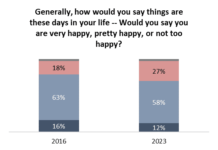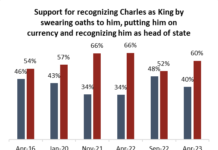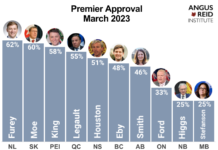
CANADIANS are divided in their view of the underlying cause of the fatal October 22 shooting attack on Parliament Hill by gunman Michael Zehaf-Bibeau.
A survey on radicalization and homegrown terrorism by the Angus Reid Institute (ARI) – in partnership with others – reveals two-in-five Canadians (38%) say the attack was an act of mental illness, while about as many (36%) say it was terrorism. One-quarter (25%) say they aren’t sure.
The online poll also suggests more Canadians believe the federal government should be putting more emphasis on preventing acts of homegrown terror than on punishment.
Key Findings:
* Prevention of radicalization:
Asked about the best places to prevent and address the radicalization process by which people become driven by violent ideology, Canadians said attention should be focused on:
* Schools (27%)
* Places of worship (25%)
* Online/Internet (23%)
* Family homes (18%)
* Community centres (8%)
* Terrorism or mental illness?
A more specific question asked respondents whether the attack and fatal shooting of military personnel on and around Parliament Hill in Ottawa by Michael Zehaf-Bibeau, was either a terrorist attack or an act of someone with a mental illness.
Canadians were almost evenly divided in their views on this issue. Nearly two-in-five (36%) said the shooting was a terrorist attack. About as many (38%) said it was an act of mental illness. The rest (25%) said they weren’t sure.
Again, a look at how respondents answered by region shows differences in opinion. In BC and Atlantic Canada, respondents said the shootings were a result of mental illness, almost two-to-one over terrorism. In Alberta, Saskatchewan and Manitoba, slightly more respondents say it was terrorism. Ontario and Quebec respondents are more evenly divided on this question.
* Prevention versus punishment
As to where the federal government should be putting more priority to address radicalization, just over half (54%) of Canadians told ARI the emphasis should be on initiatives to prevent radicalization, and one-third (34%) said government should focus on sterner measures to punish those who become driven by violent ideologies. The rest chose neither option.
Those who felt government should place priority on punishment were older: 43 per cent were aged 55+, compared to 29 per cent aged 18-34. They also were more likely to be from Saskatchewan or Manitoba.
* Views on imprisonment:
Another discussion point on the issue of how best to deal with suspected homegrown terrorists focuses on indefinite imprisonment. On this question, slightly more than half (54%) of respondents say jailing them for an unfixed amount of time only motivates suspected homegrown terrorists to commit violent crimes when they are eventually released. Slightly fewer than half (46%) say indefinite imprisonment does prevent violent crime.
* Legislation:
On October 27, the federal government introduced proposed legislation, Bill C-44, that would give the Canadian Security Intelligence Service (CSIS) increased powers to watch Canadians, the authority to operate outside Canada, and to share information about Canadians with other countries. It also gives more protection to confidential sources.
Although the introduction of this legislation didn’t come as a direct response to the shootings on Parliament Hill, it did nonetheless capture the attention of Canadians and change the tone of debate in the House of Commons.
In terms of public opinion surrounding the proposed legislation, ARI asked and found that half (51%) of Canadians felt Bill C-44 does a “good job” of addressing security threats. Just over one-quarter (27%) felt the legislation goes “too far” and steps on civil liberties; just under one-quarter (22%) said Bill C-44 doesn’t “go far enough” to protect Canadians.
Again, a deeper look into demographic and regional responses provides a more complete story. Canadians aged 18-34 are twice as likely as those aged 55+ to raise civil liberties issues vis-à-vis Bill C-44. Those aged 55+ say the legislation is too anemic by a ratio of three-to-one over younger Canadians.
Regionally, two-in-five (39%) British Columbia respondents say the proposed law goes too far. This is twice as many who answer the same in Saskatchewan (20%) and Quebec (19%). Most respondents who say the legislation doesn’t go far enough are found in Saskatchewan (27%). By contrast, only about half as many who say the same thing are found in Atlantic Canada (15%).












